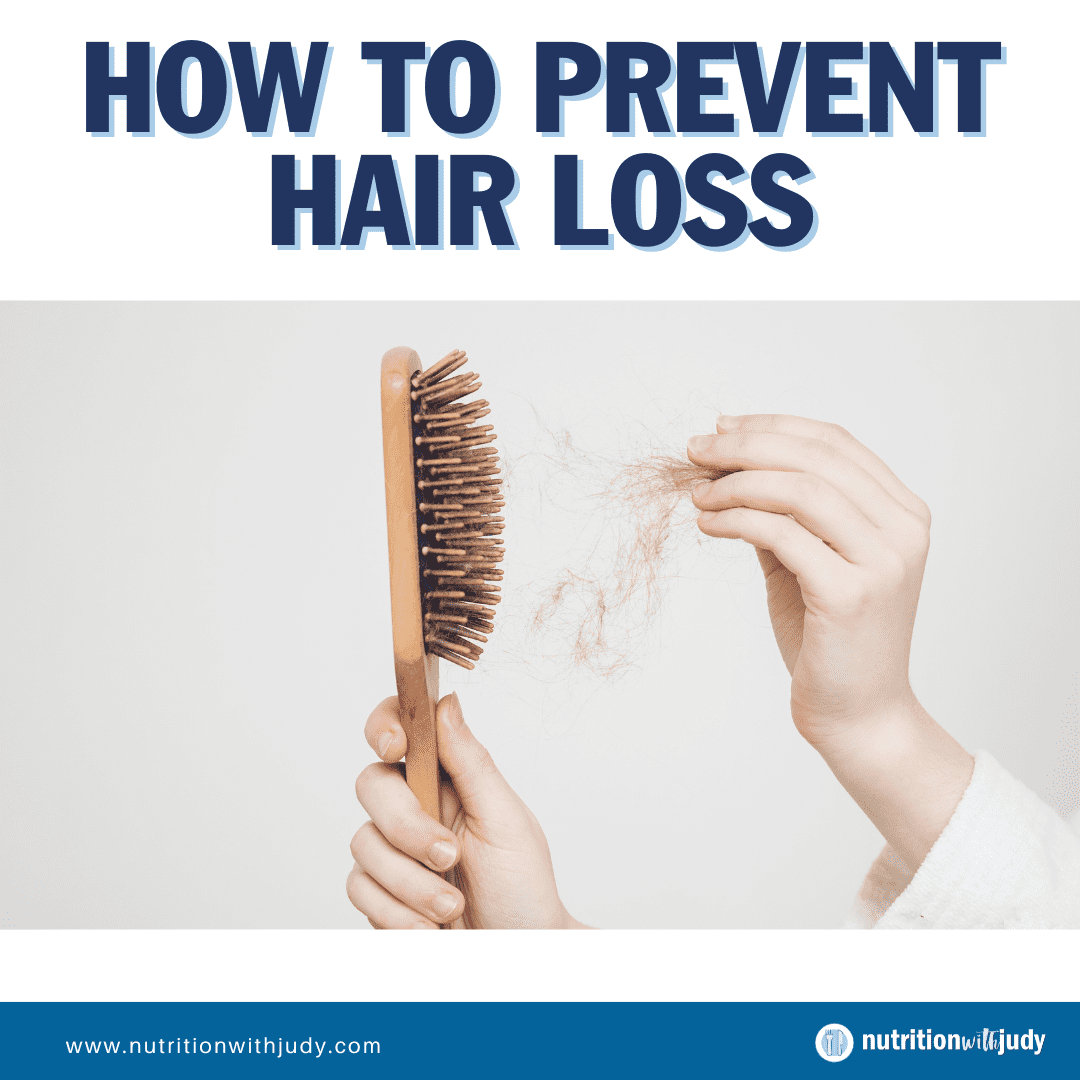

How to Prevent Hair Loss: Natural Remedies and Supports


Hair loss is an issue that can affect both men and women and even though hair loss, in and of itself, is not dangerous, it could signify a deeper problem. Even if you have no serious health concerns, it can still cause psychological damage.
We are vain creatures, even if we would rather not admit it, and judging from the annual sales of the beauty industry this point is undoubtedly true. Women, especially, spend almost $4000 per year on their hair and the haircare industry in the US is worth almost $13 million.
We tend to think of our hair as our crown and so when we notice changes it can begin to mess with our psyche.
If you are starting a carnivore or ketogenic diet, know that hair loss can sometimes occur. Also, if you suffer from something more serious like Hashimoto’s, a thyroid disorder, hair loss can start to become a larger problem.
The good news is that if you don’t have a thyroid disorder and do begin to lose hair on a low-carb diet, it is temporary and just your body’s response to adapting to a new way of eating. If you are experiencing a thyroid disorder, like Hashimoto’s, know that a low-carb-carnivore diet is incredibly therapeutic for this common, but serious issue and there are a number of remedies you can employ to increase hair growth and regain your confidence.
How Hair Grows
Hair growth doesn’t happen at a steady rate for anyone. The three primary phases of hair growth are anagen, catagen, and telogen. Most of your hair growth happens during the anagen phase, which can last between two to six years. After the anagen phase, the individual hair slows down during the catagen phase until it completely stops in the telogen phase. After about three months of inactivity, the hair is shed and the cycle continues.
Luckily, this process is staggered all over your head so not all your hair falls out at once. So even though you are losing hair every day it is unnoticeable, and you basically have the same amount of hair on your head at all times.
What Causes Hair Loss
Hair loss can happen to anybody and can be really difficult to deal with, especially for women. There are a lot of reasons that you could be experiencing hair loss and not all of them have to do with diet, however, upgrading your diet certainly has been shown to help. Some common causes of hair loss are:
- Any big diet change (did you just go carnivore or keto?)
- Breastfeeding and childbirth
- Chronic conditions (like Hashimoto’s)
- Nutrient deficiencies
- Over-exercising
- Starvation or undereating
- Stress
- Hormonal changes including menopause and PCOS
- Certain medications and therapies
- Severe infections, parasites, and particular acute illnesses
- Toxic and/or damaging hair products and treatments
Most likely, the cause is not one, but a combination of these factors with stress being a big one. If you are experiencing a lot of stress in your life combined with one or more of these factors, hair loss can become quite common. Let’s talk about how we can support ourselves and our hair by consuming the right kind of nutrients.
Nutrients Needed for Hair Growth
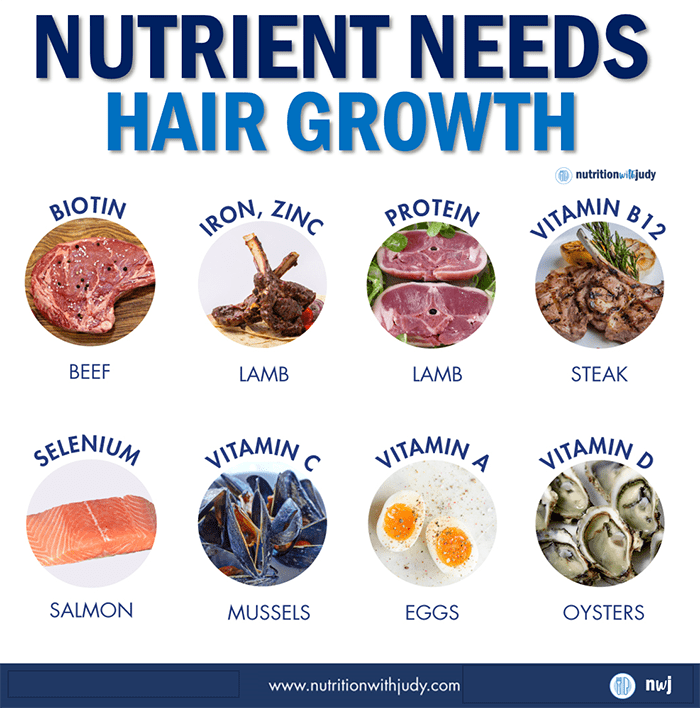

There are several key nutrients, vitamins, minerals, etc. that are needed in your diet to promote healthy hair growth. Sometimes on a ketogenic or carnivore diet, we may not be getting enough of these nutrients because our food is so satiating that we may not be eating enough. If you find that in your diet you are not getting enough of these valuable nutrients, you could consider taking them as supplements or finding whole food sources. Let’s discuss the most important ones here:
1. Biotin—This B vitamin is necessary for strong hair growth, but unfortunately, it is a tough one to get on a carnivore diet. A 2013 animal study showed that biotin deficiency was common with a low-carb diet. Carnivore foods with a higher amount of biotin are egg yolks and organ meats, especially liver. If you follow more of a ketovore or ketogenic diet, know that some nuts, especially almonds, contain biotin as well as other low-carb plant foods like avocados, broccoli, and mushrooms. If you are concerned about your biotin intake and don’t eat plants, you could consider taking it in supplement form.
2. Iron—Iron deficiency is indicated in many health conditions, including fatigue and headaches. However, the lack of iron also causes your hair to become dry, brittle, and easily damaged. The lack of iron is usually more of an issue for pre-menopausal women because they lose blood every month and are therefore losing more iron. Luckily, carnivore foods are rich in this dietary nutrient. The best carnivore diet sources of iron are:
- Dark turkey meat
- Red meat
- Shellfish
3. Protein—Keto or carnivore diets usually contain plenty of protein, however, some people still find it hard to get to the recommended macros of protein per day, this is because of how satiating the diet is. The recommendation for protein on a carnivore diet is 0.8-1 gram of protein for every pound of ideal body weight. Therefore, if I weigh 150 pounds and this is my ideal weight, I should be consuming between 120-150 grams of protein per day. If you are not hitting these recommended macros, this can result in hair loss as well as more serious issues, like loss of muscle. Try using an app like My Fitness Pal and track your macros for a few days to make sure you are hitting your protein requirements.
4. Selenium—Selenium is a mineral necessary for thyroid function and hair growth. Adequate amounts of selenium have also been known to increase hair quality. Seafood, organ meats, and Brazil nuts have the highest selenium content but this mineral can also be found in poultry, red meat, and eggs.
5. Vitamin A—Vitamin A is a necessary component of diet that supports hair growth and a host of other benefits for our bodies, including vision, skin, and a strong immune system. Once again, we are lucky here if we are eating a carnivore diet because carnivore foods are usually abundant in this vitamin. Meat, eggs, dairy, and fish are high in vitamin A so if you follow a meat-based diet you should not be lacking in this nutrient. However, we must be careful as carnivores, especially those that consume large quantities of liver because we can quickly become toxically overloaded with vitamin A. You can read more about that here. Vitamin A toxicity can actually cause hair loss so we want to be mindful of this nutrient. Other issues associated with vitamin A toxicity are:
- Bone and joint pain
- Headaches
- Nausea and vomiting
- Poor appetite
- Visual disturbances
6. Vitamin B12 (and other B vitamins)—We already mentioned biotin, which is another B vitamin imperative for hair growth. However, the full complement of B vitamins plays a role in promoting healthy hair. If you are someone who feels better when you take a B12 vitamin, then this likely means you simply aren’t getting enough or are not able to adequately absorb the amount you are consuming in your food. This can even occur with someone eating a carnivore diet, especially if their gut function is impaired.
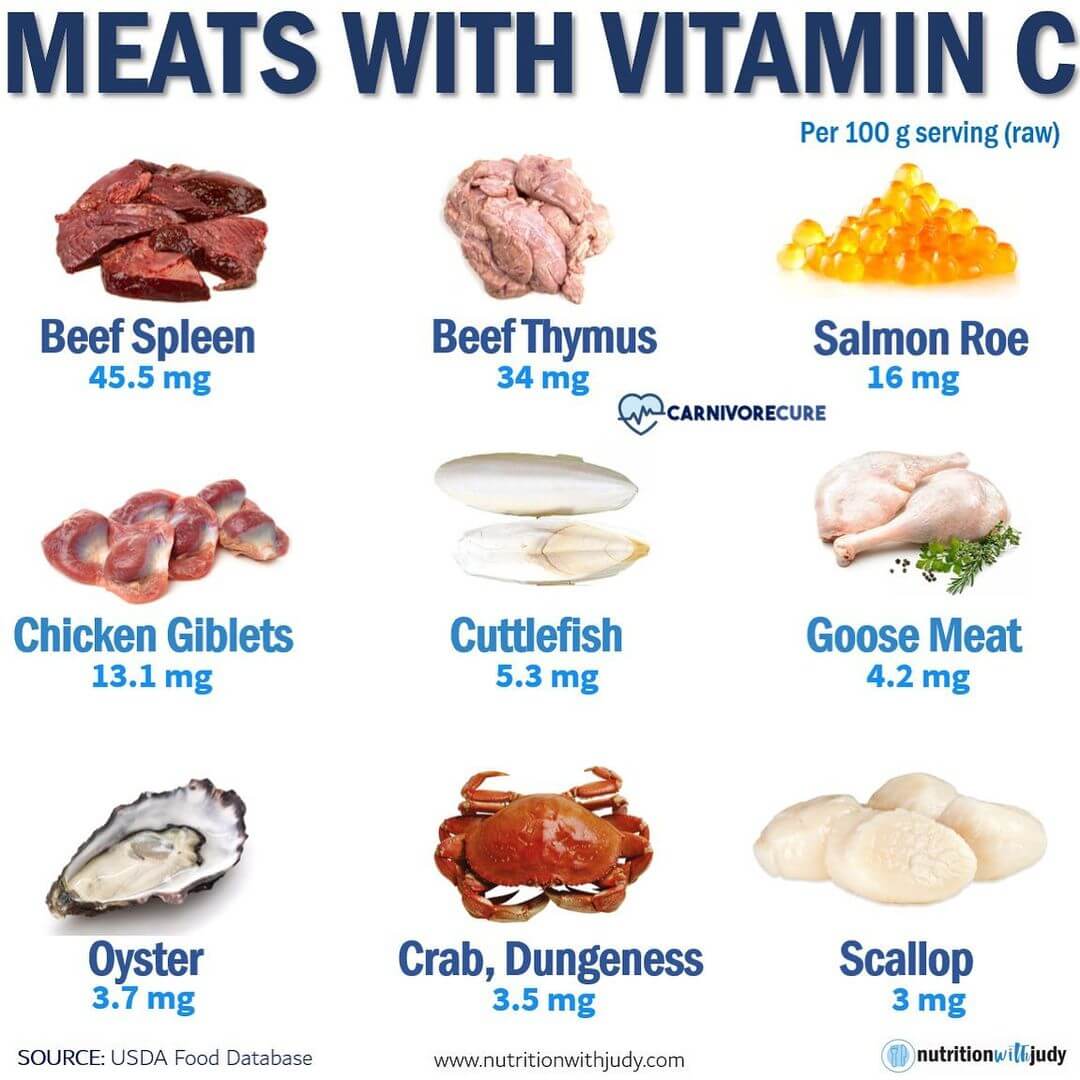

7. Vitamin C—While vitamin C plays an important role in our bodies. We all know how important vitamin C is to a healthy immune system, it also is integral to the production of collagen. Collagen is a protein that is used as one of the main building blocks of our hair. The carnivore diet does contain enough vitamin C for optimal functioning, but if you feel like your vitamin C is not adequate or just want to add more, you can get it from low-sugar citrus fruits or from a supplement. If you choose to do a supplement, try to take one that is whole-food-based like this one.
8. Vitamin D—Low vitamin D levels, which have become ubiquitous in society because we have been conditioned to fear the sun, have been associated with hair loss and a condition known as alopecia. Alopecia is an autoimmune disorder that causes the loss of hair over your entire body. Luckily, it is simple to get enough Vitamin D on a carnivore diet. Foods high in vitamin D are:
- Egg yolks
- Herring
- Oysters
- Salmon
- Sardines
- Tuna
Also, you can get sufficient vitamin D by laying out in the sun and at the same time supporting your circadian rhythm.
8. Zinc—A correlation has been discovered between low levels of zinc and hair loss. The good news is that zinc is abundant in most animal foods. The highest amount of zinc can be found in animal foods, such as:
- Beef
- Chicken
- Crab
- Oysters
- Pork
- Turkey
If you have been eating a carnivore diet for a while and still feel you are suffering from hair loss, it might be that your gut isn’t healed enough for you to absorb all the nutrients in the food you are eating. We find some clients still struggling with vitamin and protein needs even though they are strict carnivores. If you think you fall into this camp, you may want to try some gut healing supports like this. These supports are usually a temporary measure and once the gut heals your body can absorb and utilize all these nutrients on its own.
For individuals struggling with hair loss due to hormonal changes, make sure you’re getting enough healthy animal fats in your diet to fuel hormone production.
How Hashimoto’s Impacts Hair Loss
Hair loss is a common issue for those who are suffering from Hashimoto’s disease, almost 60-70% of those suffering from Hashimoto’s experience it. Hashimoto’s disease is an autoimmune disorder that severely impacts the thyroid gland. As it causes dysfunction in the thyroid, you will eventually stop producing the needed amounts of thyroid hormone. When this happens, you may begin to experience symptoms, of which hair loss is one; you may also notice changes in your hair’s texture and quality. Some other symptoms of Hashimoto’s are:
- Brittle nails
- Depression
- Dry skin
- Fatigue
- Muscle aches
- Muscle weakness
- Problems with memory
- Puffy face
- Swelling of the thyroid gland (goiter)
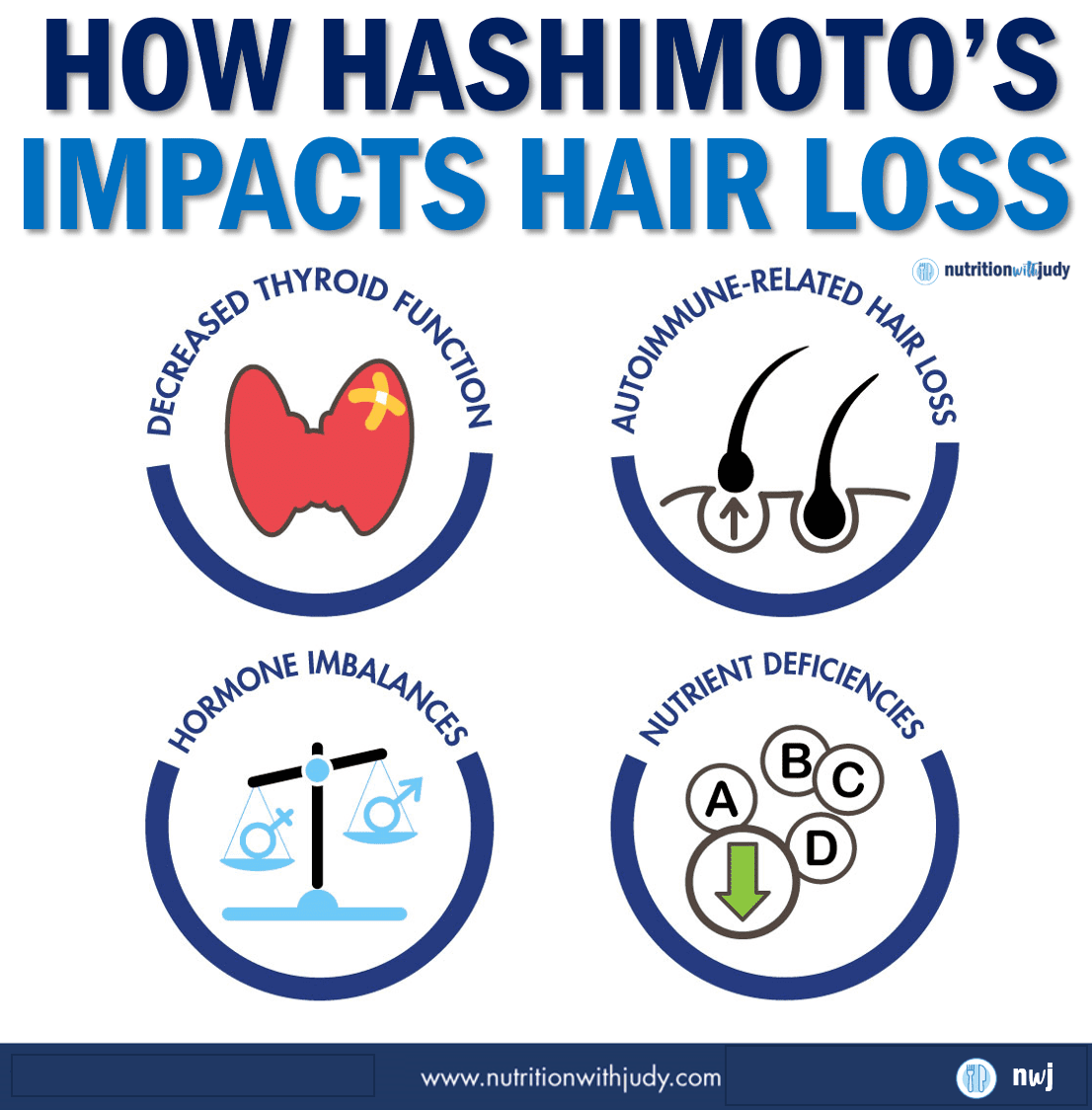

There are a few reasons why you might be experiencing hair loss if you have Hashimoto’s. Let’s look at these in more depth:
1. Decreased functioning in your thyroid—This happens because when you have Hashimoto’s your thyroid is unable to produce enough thyroid hormone, which results in hair loss. This usually occurs on the entirety of your head and cause also affects other areas like your eyebrows. The remedy here is to boost your thyroid function. You can try the natural route like taking iodine and eating a carnivore diet. While these certainly help to support your thyroid, this avenue does take some time for results to manifest. Most people decide to take medication and then reduce the dosage as their thyroids begin to recover from diet and lifestyle changes.
2. Autoimmune-related hair loss—Unfortunately, if you acquire one autoimmune disease, the statistics show that you are likely to acquire more. One of these that you might acquire is alopecia. Alopecia can impact anyone, but it does tend to be more prevalent in patients who have already received a Hashimoto’s diagnosis. Unfortunately, alopecia is more challenging to treat than decreased function in the thyroid. In order to treat this type of hair loss, clinicians focus on boosting the health of your immune system and try to reduce overall inflammation in the body. Also, this is the rarest form of hair loss with Hashimoto’s, so if you are experiencing hair loss, this cause is unlikely.
3. Hormone imbalances—This type of hair loss occurs because your sex hormones become dysregulated when you have Hashimoto’s. Women with Hashimoto’s could start to experience male-pattern baldness, which means the top of their heads starts to lose hair. The reason for this is that the sex hormones are out of balance and so testosterone begins to take over. To address this type of hair loss, you would need to have your hormones tested and if you discover they are dysregulated then you would need to work with your practitioner in order to optimize their function.
4. Nutrient deficiencies—Please re-examine the list above about the nutrients needed for hair growth. It has been found that patients suffering from Hashimoto’s are often low in almost all these nutrients.
The good news is that if you are suffering from hair loss related to Hashimoto’s, most of the problems can be addressed and the hair loss can be reversed.
Top Tips to Prevent Hair Loss
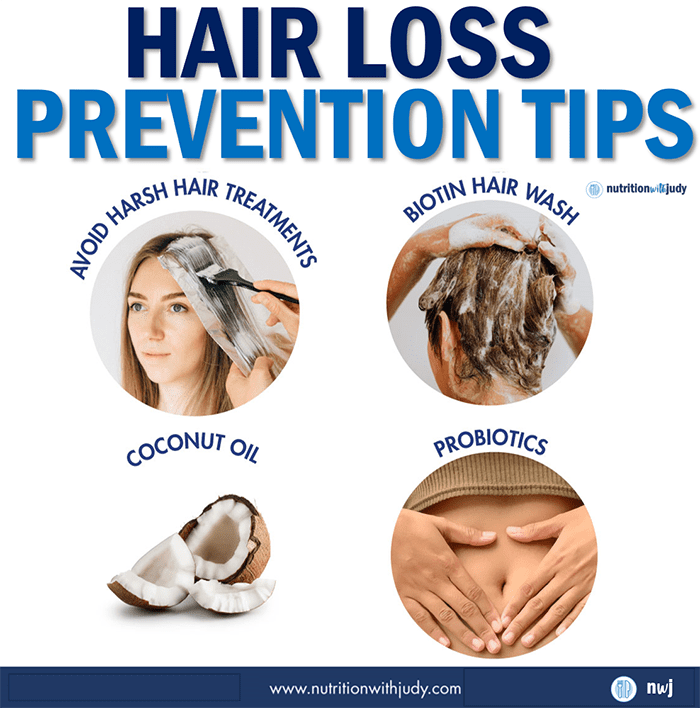

Making sure you aren’t suffering from a disorder, optimizing your diet, and being patient are all keys to restoring your hair. However, here are some additional tips you may want to consider to help regrow hair more quickly and keep it healthy.
- Avoid harsh hair treatments—Some of the activities we do with our hair to make it beautiful sometimes cause harm. Consider taking a break from the stringent and caustic treatments you may be doing like coloring, straightening, curling, or relaxing. These can be heavy in harsh chemicals and not only are most not good for your hair, but they can be troublesome for your organ systems as well.
- Biotin hair washes—You may want to consider washing your hair with a raw scrambled egg instead of shampoo. Eggs are an excellent source of biotin and when applied directly they can strengthen and fortify your hair as it grows. People report great success with utilizing this washing technique.
- Try coconut oil—A review of coconut oil discovered that it is beneficial in preventing hair damage due to the loss of protein. The nice thing about coconut oil too is that it easily absorbs into hair, unlike other oils. You can use it by massaging coconut oil into your scalp to promote blood flow and hair growth and you can use it to make a hair mask to deeply condition your hair and prevent breakage and dryness.
- Consider probiotics—If you are noticing your hair loss is the result of a massive diet change, then you can reverse and restart the hair-growing process by supporting your microbiome. Probiotics are bacteria, usually in capsule form, that can be taken to help support the good bacteria in our guts. When we make a massive dietary change, the bacteria in our guts can become disrupted and we may experience gastrointestinal distress or other symptoms like hair loss, but by taking probiotics you can help to restore the bacteria and mitigate some of the damage. They also support your body’s digestion pathways and make it easier for us to digest our food. If we can utilize and assimilate all the nutrients in our food, the nutrients needed for hair growth can get to the cells that need them.
- Wash and dry gently—Use gentle hair care products and avoid harsh chemicals. If you use something that is too harsh this can cause your hair to become dry, brittle, and suffer breakage. Additionally, limit the time you blow dry your hair or add heat, and try not to rub your hair too much after washing to dry it. Dry your hair gently with a towel and then allow it to air dry. The friction from rubbing your head too much when trying to dry hair can cause it to break.
Work With Our Trusted Holistic Functional Nutritional Therapy Practitioners for Treating and Preventing Hair Loss
Hair loss is real and can be problematic for many, but there are also ways to support your body to prevent or stop it from continuing. By taking care to eat a healthy, diverse carnivore diet and taking gut supplements if we think we need them, we can make sure our bodies are able to use all the healthy nutrients we are getting from our food. Additionally, by making sure that we are being gentle with our hair, providing it nourishing nutrients while we wash it, avoiding heat and harsh treatments, and working to reduce our stress we can further support the growth of healthy hair.
If you are struggling or maybe believe you have gut dysfunction that is limiting your body from absorbing key nutrients, consider purchasing the gut healing kit supplements. If you would like to work with a Nutrition with Judy nutritionist to discuss Hashimoto’s, hair loss, gut dysfunction, or any other health problem you may be facing, we are currently taking new clients. Consider purchasing the Symptom Burden Assessment and working one-on-one with a nutritionist to optimize your health and diet. Hair loss can be healed, and we can help you on your journey to optimize your hair as well as your health.
Start your root-cause healing journey today and contact us any time with any questions or concerns.
DISCLAIMER: This content is for educational purposes only. While we are board-certified in holistic nutrition and are nutritional therapy practitioners, we are not providing medical advice. Whenever you start a new diet or protocol, always consult with your trusted practitioner first.






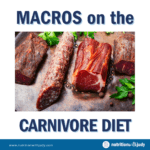
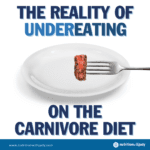
Elaine Silva
December 16, 2023 at 11:24 pmDoes this cost money
I have Hashimoto disease and I also have severe hair loss lately. With tiredness and so much more my thyroid medicine has not been working. Also, I would like to find out more for my knees who has bipolar and it times schizophrenia. She’s a young mother, and certainly needs a lot of help nutritionally
Nyl
December 17, 2023 at 12:53 amHair can grow up to 7 years, not only 3.
It’s not only too much androgens/ testosterone causing hair loss. Any hormonal inbalance like (peri-) menopause (eg too little progesterone or estrogen dominance) can cause hair loss. Sad that’s not looked into in this article.
Melissa
December 17, 2023 at 6:07 amI would encourage people to test their vitamin D levels before assuming that they’re good because they spend time in the sun. I spend a lot of time in the sun, so when I was chronically ill it never occured to me that my vitamin D levels were a contributing factor. My nurse practitioner included that in some tests she ordered, and I was shocked to find that not only was I deficient, I was severely deficienct. I started supplementing right away, and it was like I had a new lease on life. Please, please, if you’re struggling, order this test. What do you have to lose?
I’ve been carnivore since January of 2019, I’ve found that I also need to supplement B vitamins on and off, and vitamin C. I wouldn’t change my diet at all, but it’s not fool proof.